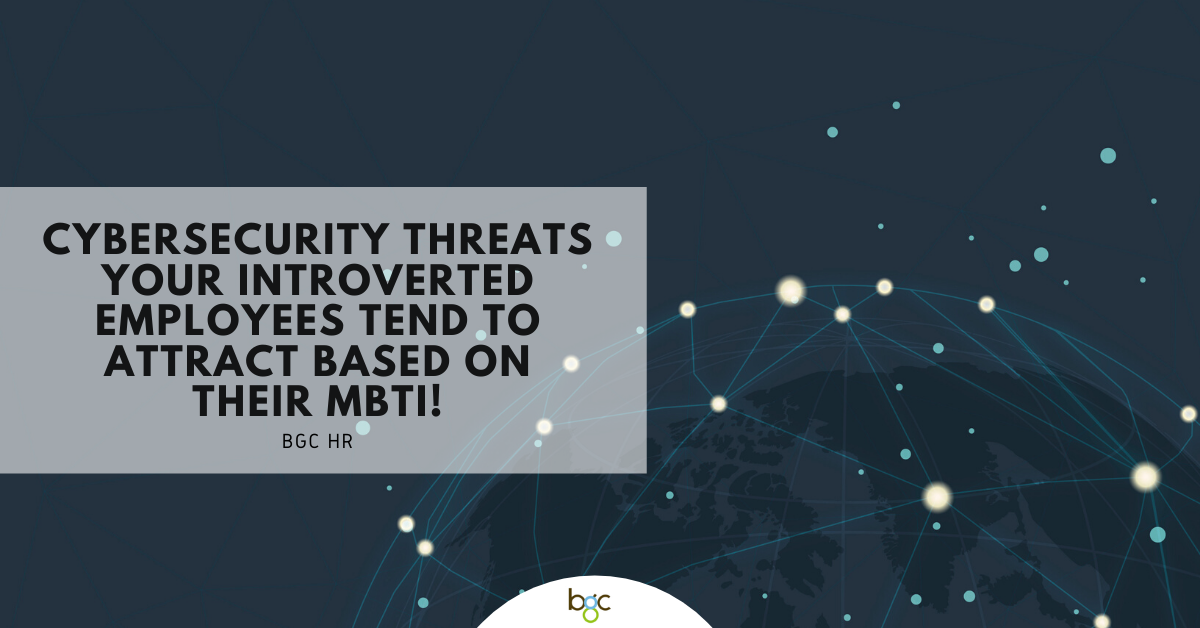Can your personality type make you more susceptible to different cyber security attacks? A 2019 study has revealed the link between one’s MBTI (Myers-Briggs Type Indicator) personality type and the vulnerability to different types of cybercrime.
The MBTI personality type assessment aims to assess people according to four preferences:
Extraversion/Introversion:This shows where the individual gains their energy. Extraversion (E) refers to social interaction whilst Introversion (I) refers to alone time.
Sensing/Intuition:This is indicative of how the individual learns. Sensors (S) prefer logic and hard facts. Whilst Intuitors (N) has a preference for gut feel and abstract concepts.
Thinking/Feeling: Simply put, this shows how an individual makes decisions. Thinkers (T) make decisions based on logic and facts. Feelers (F) on the other hand, decide based on their emotions.
Judging/Perceiving:In the MBTI world, this refers to the individual’s preference for either a more structured or open-ended lifestyle. Judgers (J) are more firm, direct and decisive. Perceivers (P) are often more adaptable with better listening skills.
Keep in mind, that despite these differences, all personality types are likely to fall for cyber threats when they’re uneducated. When it comes to risks, anyone unacquainted with proper cyber security hygiene is at risk of a data breach. Curious to find out more?
Here are the different types of cyber security threats your employees will fall for based on their MBTI type.
Sensing

Introverted personality types can be broken down further into two different groups: Sensing and Intuitives. Unlike Extroverts, Introverts are not as quick to pick up on attacks coming in from outside. Sensors can be described as people more concerned about present-day details. To put it simply, Sensors are practical individuals.
ISFP
As an individual that leads by their F (Feeling) function, the ISFP is more likely to fall for social engineering attacks. However, as Sensors, these individuals are able to spot phishing attacks compared to their Intuitive (NF) colleagues.
Generally, once educated with the rules of cyber hygiene, the ISFP follows the IT security rules and policies closely.
Cyber security Tips for the ISFP
Think before clicking into that email or website
Remember that people online have the potential to dupe you, regardless of how they might seem
ISTP
The ISTP is someone that naturally has a mistrust of systems and of other people online. Unfortunately, as a Thinker, these individuals might over-estimate their own competence, which could lead to potential mistakes.
Cyber security Tips for the ISTP
Try not to bend rules. Instead, focus on the reasons for the rules in place.
Doing things on your own can be risky.
ISTJ
These personality types are very likely to spot discrepancies and errors in phishing emails. Generally, these types follow IT security, rules, and policies. The only real problem with ISTJ employees is that they overestimate their own acumen. Which may lead to potential cyber breaches.
Cyber security Tips for the ISTJ
Try not to reuse passwords or variations of the same passwords
You should try to rely on more than previous experience as a guide
ISFJ
Also known as the “Defender”, the ISFJ is a personality type that is meticulous when it comes to defending themselves against potential cyber security threats. They’re more likely to spot discrepancies and errors when it comes to phishing emails. Additionally, these trustworthy employees don’t fall for the same cyber security attack, twice.
Cyber security Tips for the ISFJ
As a “Feeling” type, you should be aware that online, people might not be who they are.
Try to avoid using or trusting a public wifi when you’re trying to send emails or messages with sensitive data.
Intuitives

Intuitives on the other hand, are more likely to fall for a phishing email attack that plays on their emotions. Think a false charity email. Unlike sensors, these individuals generate ideas and possibilities based on the information they’ve gathered.
INFP
Fortunately, the INFP is an individual that is unlikely to make sudden or risky choices. One thing’s for sure, this personality type is one that prefers to do things on their own terms and in their own way.
But as a nurturing type, the INFP can see the need to follow the rules of cyber security and cyber hygiene when they’re made aware of the effects of poor security on their colleagues and friends.
Cyber security Tips for the INFP
Follow the IT security rules set by your organization. Don’t try to bend or go against them. This helps you avoid harming the people that you care about.
INTP
The INTP is a personality that is often described as analytical and quiet. Which is why they’re pretty knowledgeable when it comes to cyber security-related issues. The INTP is also very aware of potential threats and cyberattacks. However, one major flaw to the INTP personality is that they tend to overestimate their intellect. This might lead to potential pitfalls and cyberattacks.
Cyber security Tips for the INTP
Find the IT security rules for your organization and stick to them!
Despite your intellect, rules are not made to be broken. Try to adhere to them, to prevent potential cyber security breaches.
INTJ
Often found working in industries such as tech and cyber security, the INTJ is often someone already acquainted with the rules of cyber security. As such, the INTJ generally follows IT security rules and policies.
Much like the INTP, the INTJ can sometimes overestimate their intellect - leading them to fall for cyber attacks. Additionally, as a “Thinking” type, the INTJ is often encouraged to build self-awareness, to avoid falling for common cyber security pitfalls.
Cyber security Tips for the INTJ
Try to broaden your knowledge. You can still fall for cyberattacks even if rules don’t seem to be necessary to you.
If you want to be competent, try to check the details of emails that you’ve received before opening or replying to a potential phishing email.
INFJ
Much like the INFP, the INFJ is a nurturing personality type. These individuals’ weaknesses can also be an asset for cyber security. The INFJ tends to overthink, over-complicate, and look for hidden meanings. However, as a “Feeling” type, INFJs are more likely to fall victim to social engineering attacks.
Cyber security Tips for the INFJ
If your gut feeling dictates that something doesn’t feel right, check the email and/or website over and over again.
When it comes to details, check and check again.
Are you an extrovert? Check out our “Cyber security Threats Your Extroverted Employees Tend to Attract Based on their MBTI Types” here.
Read More: How to Interview Tech and Cyber security Candidates in Singapore
